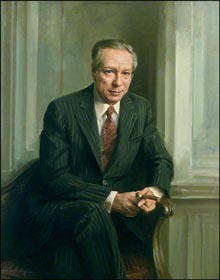
Sec. W. Michael Blumenthal
Everett Raymond Kinstler
Oil on canvas
1977
56 1/4 x 46 x 3 1/2"
P.1977.1
Born in Berlin, W. Michael Blumenthal (b.1926) fled the Nazis in 1939 and moved to the United States in 1946. He had held several public offices, including Deputy Assistant Secretary of State for Economic Affairs under President Kennedy and Deputy Special Representative for Trade Negotiations under President Johnson, before being named Secretary of the Treasury by President Jimmy Carter in 1977. Secretary Blumenthal was acceptable both to business, because of his unabashed espousal of capitalism, and to labor, because of his progressive employment and social policies. He supported fiscal and monetary restraint and was firmly opposed to any sort of wage or price controls. "The government's role is to motivate [the private sector], to assure that it performs in a way which serves the public interest," he asserted. "When the private sector fails the government should step in, but not until then." However, in a period of inflation, U.S. currency depreciation, and budget deficits, Blumenthal's policy inched too slowly toward fiscal restraint. He left Treasury after a Cabinet reorganization in 1979.
About the Artist
Everett Raymond Kinstler (1926 - ) has painted more Cabinet portraits than any other artist. His legacy, however, seemed threatened in 1977 when President Jimmy Carter declared that there were to be no more official oil portraits of the Cabinet: in the interest of economy, photographic portraits would have to suffice. Believing that the consistency of the existing collection of painted Treasury Secretary portraits would be compromised by a photograph, friends of Secretary Blumenthal raised funds to have his portrait painted in 1979, shortly after Blumenthal left office. The commission went, not surprisingly, to Kinstler.